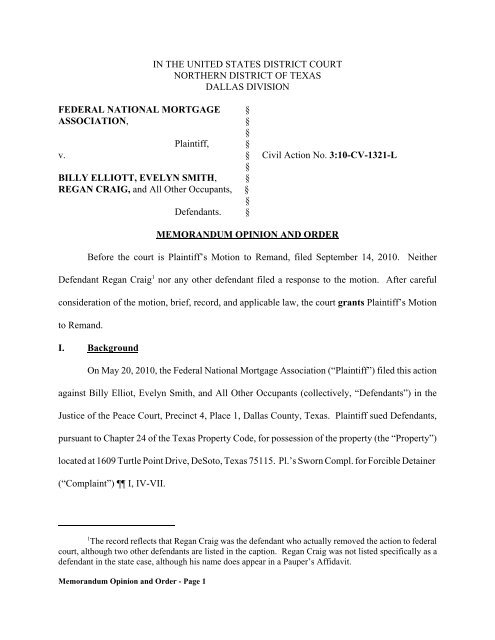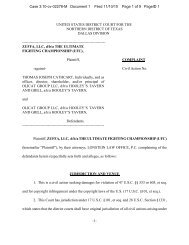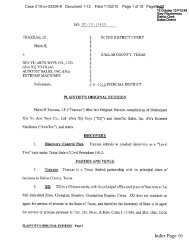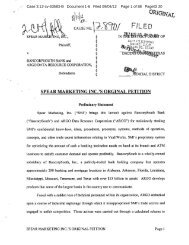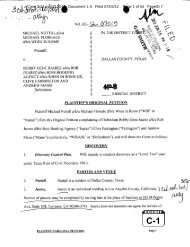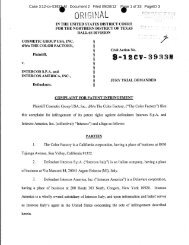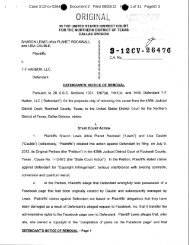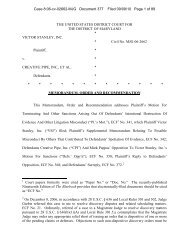here - Northern District of Texas Blog
here - Northern District of Texas Blog
here - Northern District of Texas Blog
Create successful ePaper yourself
Turn your PDF publications into a flip-book with our unique Google optimized e-Paper software.
IN THE UNITED STATES DISTRICT COURT<br />
NORTHERN DISTRICT OF TEXAS<br />
DALLAS DIVISION<br />
FEDERAL NATIONAL MORTGAGE §<br />
ASSOCIATION, §<br />
§<br />
Plaintiff, §<br />
v. § Civil Action No. 3:10-CV-1321-L<br />
§<br />
BILLY ELLIOTT, EVELYN SMITH, §<br />
REGAN CRAIG, and All Other Occupants, §<br />
§<br />
Defendants. §<br />
MEMORANDUM OPINION AND ORDER<br />
Before the court is Plaintiff’s Motion to Remand, filed September 14, 2010. Neither<br />
Defendant Regan Craig 1 nor any other defendant filed a response to the motion. After careful<br />
consideration <strong>of</strong> the motion, brief, record, and applicable law, the court grants Plaintiff’s Motion<br />
to Remand.<br />
I. Background<br />
On May 20, 2010, the Federal National Mortgage Association (“Plaintiff”) filed this action<br />
against Billy Elliot, Evelyn Smith, and All Other Occupants (collectively, “Defendants”) in the<br />
Justice <strong>of</strong> the Peace Court, Precinct 4, Place 1, Dallas County, <strong>Texas</strong>. Plaintiff sued Defendants,<br />
pursuant to Chapter 24 <strong>of</strong> the <strong>Texas</strong> Property Code, for possession <strong>of</strong> the property (the “Property”)<br />
located at 1609 Turtle Point Drive, DeSoto, <strong>Texas</strong> 75115. Pl.’s Sworn Compl. for Forcible Detainer<br />
(“Complaint”) I, IV-VII.<br />
1 The record reflects that Regan Craig was the defendant who actually removed the action to federal<br />
court, although two other defendants are listed in the caption. Regan Craig was not listed specifically as a<br />
defendant in the state case, although his name does appear in a Pauper’s Affidavit.<br />
Memorandum Opinion and Order - Page 1
From what the court can glean from the record, service <strong>of</strong> the citation on Defendants Elliott<br />
and Smith was done pursuant to Rule 742(a) <strong>of</strong> the <strong>Texas</strong> Rules <strong>of</strong> Civil Procedure, which allows<br />
service <strong>of</strong> the citation by “securely affix[ing] [it] to the front door or main entry to the premises.”<br />
Service took place on May 26, 2010. Also, the record reflects that the constable mailed a copy <strong>of</strong><br />
the citation to these two defendants.<br />
On June 3, 2010, Justice <strong>of</strong> the Peace Michael Petty issued a default judgment in favor for<br />
Plaintiff against Defendants Elliott and Smith, and All Other Occupants <strong>of</strong> the Property. T<strong>here</strong>after,<br />
on June 8, 2010, Regan Craig (“Craig”), apparently one <strong>of</strong> the occupants <strong>of</strong> the Property, appealed<br />
the judgment to the County Court at Law. On June 21, 2010, County Court at Law No. 2, Dallas<br />
County, <strong>Texas</strong>, issued a letter to Defendants Elliott and Smith, and Plaintiff’s counsel, advising them<br />
that the appeal was set for a hearing on July 8, 2010. Defendants did not file an answer in state<br />
court.<br />
On July 7, 2010, Craig removed this action to federal court on the bases that complete<br />
diversity <strong>of</strong> citizenship existed between the parties and that the amount in controversy exceeded<br />
$75,000, exclusive <strong>of</strong> interest and costs. In his Notice <strong>of</strong> Removal, Craig acknowledges that he is<br />
an “individual resident citizen[] <strong>of</strong> the State <strong>of</strong> <strong>Texas</strong>” and was such a citizen at the time the action<br />
was commenced and at the time it was removed from state court. Notice <strong>of</strong> Removal III(b)(i).<br />
Plaintiff seeks to have this action remanded because it contends that: (1) no subject matter<br />
jurisdiction exists; (2) no federal question is raised in Plaintiff’s Complaint; (3) Craig is a local<br />
defendant; and (4) removal by Craig was not timely in that it occurred more than thirty days after<br />
he was served with Plaintiff’s suit.<br />
Memorandum Opinion and Order - Page 2
II.<br />
Legal Standard for Subject Matter Jurisdiction<br />
A federal court has subject matter jurisdiction over civil cases “arising under the<br />
Constitution, laws, or treaties <strong>of</strong> the United States,” or over civil cases in which the amount in<br />
controversy exceeds $75,000, exclusive <strong>of</strong> interest and costs, and in which diversity <strong>of</strong> citizenship<br />
exists between the parties. 28 U.S.C. §§ 1331, 1332. Federal courts are courts <strong>of</strong> limited<br />
jurisdiction and must have statutory or constitutional power to adjudicate a claim. See Home<br />
Builders Ass’n, Inc. v. City <strong>of</strong> Madison, 143 F.3d 1006, 1010 (5th Cir. 1998). Absent jurisdiction<br />
conferred by statute or the Constitution, they lack the power to adjudicate claims and must dismiss<br />
an action if subject matter jurisdiction is lacking. Id.; Stockman v. Federal Election Comm’n, 138<br />
F.3d 144, 151 (5th Cir. 1998) (citing Veldhoen v. United States Coast Guard, 35 F.3d 222, 225 (5th<br />
Cir. 1994)). A federal court has an independent duty, at any level <strong>of</strong> the proceedings, to determine<br />
whether it properly has subject matter jurisdiction over a case. See Ruhgras AG v. Marathon Oil<br />
Co., 526 U.S. 574, 583 (1999) (“[S]ubject-matter delineations must be policed by the courts on their<br />
own initiative even at the highest level.”); McDonal v. Abbott Labs., 408 F.3d 177, 182 n.5 (5th Cir.<br />
2005) (“federal court may raise subject matter jurisdiction sua sponte”).<br />
A federal court has subject matter jurisdiction over cases arising under the Constitution,<br />
laws, or treaties <strong>of</strong> the United States, commonly referred to as “arising under” jurisdiction. 28<br />
U.S.C. § 1331. This provision for federal question jurisdiction is generally invoked by plaintiffs<br />
pleading a cause <strong>of</strong> action created by federal law (such as claims brought pursuant to 42 U.S.C. §<br />
1983, or by defendants removing to federal court because the plaintiff's claim arises under federal<br />
law.) This, <strong>of</strong> course, is not the only manner in which federal question jurisdiction arises.<br />
Memorandum Opinion and Order - Page 3
The Supreme Court recently dealt with what it called a “longstanding, if less frequently<br />
encountered, variety <strong>of</strong> ‘federal arising under’ jurisdiction.” Grable & Sons Metal Prods., Inc. v.<br />
Darue Eng’g & Mfg., 545 U.S. 308, 312 (2005). Grable makes it unequivocally clear that, under<br />
this type <strong>of</strong> “arising under” jurisdiction, the existence <strong>of</strong> a cause <strong>of</strong> action created by federal law is<br />
not a prerequisite to establish federal question jurisdiction pursuant to 28 U.S.C. § 1331 or removal<br />
jurisdiction pursuant to 28 U.S.C. § 1441(a). Id. In deciding whether a state law claim invokes<br />
federal jurisdiction, “the question is, does a state-law claim necessarily raise a stated federal issue,<br />
actually disputed and substantial, which a federal forum may entertain without disturbing any<br />
congressionally approved balance <strong>of</strong> federal and state judicial responsibilities.” Id. at 314.<br />
Otherwise stated, as “the presence <strong>of</strong> a disputed federal issue and the ostensible importance <strong>of</strong> a<br />
federal forum are never necessarily dispositive,” id., a federal court is to decline jurisdiction if the<br />
exercise <strong>of</strong> its jurisdiction is inconsistent “with congressional judgment about the sound division <strong>of</strong><br />
labor between state and federal courts governing application <strong>of</strong> [28 U.S.C.] § 1331.” Id. at 313-14.<br />
When a pleading only sets forth state law claims, a federal district court has federal question<br />
jurisdiction to entertain the action only if “(1) the state law claims necessarily raise a federal issue<br />
or (2) the state law claims are completely preempted by federal law.” Bernhard v. Whitney Nat’l<br />
Bank, 523 F.3d 546, 551 (5th Cir. 2008).<br />
Whether federal question jurisdiction exists over a case removed from state to federal court,<br />
or one originally filed in such court, ordinarily “must be determined by reference to the ‘wellpleaded<br />
complaint.’” Merrell Dow Pharmaceuticals Inc. v. Thompson, 478 U.S. 804, 808 (1986)<br />
(citation omitted). In other words, the complaint must “raise[] issues <strong>of</strong> federal law sufficient to<br />
Memorandum Opinion and Order - Page 4
support federal question jurisdiction.” Rodriguez v. Pacificare <strong>of</strong> Tex., Inc., 980 F.2d 1014, 1017<br />
(5th Cir. 1993).<br />
Any doubts as to the propriety <strong>of</strong> the removal should be construed strictly in favor <strong>of</strong> remand.<br />
Manguno v. Prudential Prop. and Cas. Ins. Co., 276 F.3d 720, 723 (5th Cir. 2002). “The burden<br />
<strong>of</strong> establishing subject matter jurisdiction in federal court rests on the party seeking to invoke it.”<br />
St. Paul Reinsurance, 134 F.3d at 1253. Accordingly, if a case is removed to federal court, the<br />
defendant has the burden <strong>of</strong> establishing subject matter jurisdiction; if a case is initially filed in<br />
federal court, the burden rests with the plaintiff to establish that the case “arises under” federal law,<br />
or that diversity exists and that the amount in controversy exceeds the jurisdictional threshold.<br />
Having set forth the applicable standard, the court now addresses Plaintiff’s grounds for<br />
remand. For the reasons stated, Craig fails to carry his burden and establish that this court has<br />
subject matter jurisdiction.<br />
III.<br />
Analysis<br />
A. Federal Question<br />
Plaintiff moves to remand because it contends that no federal question jurisdiction is raised<br />
by the Complaint and the court t<strong>here</strong>fore lacks subject matter jurisdiction over this action. Craig<br />
contends the court has subject matter jurisdiction because this action presents “a federal question<br />
pursuant to the Protecting Tenants at Foreclosure Act <strong>of</strong> 2009” (the “Foreclosure Act”). Notice <strong>of</strong><br />
Removal III (b)(vi). For federal question jurisdiction to be invoked, a plaintiff’s claim must arise<br />
under federal law. 28 U.S.C. § 1441. In general, removal is proper only when the state court action<br />
initially could have been filed in a federal court. Plaintiff argues that nothing within the Foreclosure<br />
Memorandum Opinion and Order - Page 5
Act is an element <strong>of</strong> its required pro<strong>of</strong> in establishing a claim under the statutory framework <strong>of</strong><br />
section 24.002 <strong>of</strong> <strong>Texas</strong> Property Code (Vernon 2000).<br />
The court agrees with Plaintiff. In reference to the “well pleaded complaint” requirement,<br />
the Complaint must raise “issues <strong>of</strong> federal law sufficient to support federal question jurisdiction.”<br />
Rodriguez, 980 F.2d at 1017. Forcible detainer actions do not meet this standard. Plaintiff’s<br />
Complaint is simply one to evict Defendants and obtain physical possession <strong>of</strong> the Property under<br />
state law. The Complaint raises no federal claim or issue and provides no basis for federal question<br />
jurisdiction. The proper court for a forcible detainer action under <strong>Texas</strong> law is “[a] justice court in<br />
the precinct in which the real property is located . . . .” Tex. Prop. Code Ann. § 24.004 (Vernon<br />
2000). Because the Complaint does not raise a federal issue and no state law claim has been<br />
completely preempted by federal law, this court lacks subject matter jurisdiction on this basis to<br />
entertain this action.<br />
Craig’s reliance on the Foreclosure Act is also unavailing for another reason. A defense to<br />
a state-law claim that rests on federal law is insufficient to establish federal question jurisdiction.<br />
“A case may not be removed to federal court on the basis <strong>of</strong> a federal defense . . . even if the defense<br />
is anticipated in the plaintiff's complaint, and even if both parties concede that the federal defense<br />
is the only question truly at issue.” Caterpillar Inc. v. Williams, 482 U.S. 386, 393 (1987). “[T]he<br />
fact that federal law may provide a defense to a state claim is insufficient to establish federal<br />
question jurisdiction. . . . Even an inevitable federal defense does not provide a basis for removal<br />
jurisdiction.” Bernhard, 523 F.3d at 550-51 (citations omitted). Even if the Foreclosure Act<br />
supplied a federal defense for Craig, it would still be insufficient for federal jurisdiction because<br />
Plaintiff’s pleadings must raise the federal claim or issue. Plaintiff’s pleadings do not provide a<br />
Memorandum Opinion and Order - Page 6
federal basis; thus, t<strong>here</strong> is no federal question under the well-pleaded complaint rule. Craig has not<br />
met his burden in establishing federal question jurisdiction over this action. The court t<strong>here</strong>fore<br />
determines that no federal question is raised by Plaintiff’s Complaint.<br />
B. Diversity<br />
1. Citizenship and Timeliness <strong>of</strong> Removal<br />
Craig adequately shows that diversity <strong>of</strong> citizenship exists between him, as well as the other<br />
defendants, and Plaintiff. Plaintiff does not contest diversity, and the record reflects that diversity<br />
exists between the parties; however, ordinarily, neither Craig nor the other defendants would be able<br />
to remove because <strong>of</strong> a statutory prohibition on removal by a local or in-state defendant.<br />
The statute that governs removal <strong>of</strong> cases in general is 28 U.S.C. § 1441. The relevant<br />
provision <strong>of</strong> the statute provides:<br />
Any civil action <strong>of</strong> which the district courts have original<br />
jurisdiction founded on a claim or right arising under the<br />
Constitution, treaties or laws <strong>of</strong> the United States shall be removable<br />
without regard to the citizenship or residence <strong>of</strong> the parties. Any<br />
other such action shall be removable only if none <strong>of</strong> the parties in<br />
interest properly joined and served as defendants is a citizen <strong>of</strong> the<br />
State in which such action is brought.<br />
28 U.S.C. § 1441(b). Although this statute allows removal based on diversity, it does not apply to<br />
those actions in which any defendant is a citizen <strong>of</strong> the state in which the action is brought. Id.;<br />
Caterpillar, Inc. v. Lewis, 519 U.S. 61, 68 (1996); McKay v. Boyd Constr. Co., 769 F.2d 1084, 1087<br />
(5th Cir. 1985). In this case, however, this action may remain in federal court because Plaintiff has<br />
waived its right to object to removal on this ground. “A motion to remand the case on the basis <strong>of</strong><br />
any defect other than lack <strong>of</strong> subject matter jurisdiction must be made within 30 days after the filing<br />
<strong>of</strong> the notice <strong>of</strong> removal under section 1446(a).” 28 U.S.C. § 1447(c). Failure to seek remand<br />
Memorandum Opinion and Order - Page 7
within 30 days <strong>of</strong> removal constitutes a waiver <strong>of</strong> the right to challenge the removal. Coury v. Prot,<br />
85 F.3d 244, 253 (5th Cir. 1996); Baris v. Sulpicio Lines, Inc., 932 F.2d 1540, 1543 (5th Cir. 1991).<br />
Craig removed this action on July 7, 2010, and Plaintiff filed its motion to remand on September 14,<br />
2010, 69 days after the action was removed from state court. Accordingly, it is undisputed that<br />
Plaintiff failed to challenge the removal in a timely manner, and it has, t<strong>here</strong>fore, waived its right<br />
to object to the removal on grounds that Craig is an in-state or local defendant.<br />
Likewise, Plaintiff’s argument that Defendant did not remove within 30 days as required by<br />
28 U.S.C. § 1446(a) is without merit. A “[f]ailure to remove within the thirty-day time limit set<br />
forth in § 1446(a) constitutes a ‘defect in removal procedure’ within the meaning <strong>of</strong> § 1447(c).”<br />
Federal Deposit Ins. Corp. v. Loyd, 955 F.2d 316, 320-21 (5th Cir. 1992) (citations omitted). The<br />
time limitation for an action to be removed is not jurisdictional; “it is merely modal and formal and<br />
may be waived.” Tedford v. Warner-Lambert Co., 327 F.3d 423, 426 (5th Cir. 2003) (citations<br />
omitted). Plaintiff did not file a motion to remand until 69 days after Craig removed the action to<br />
federal court; t<strong>here</strong>fore, it has waived its right to object to the removal as being untimely.<br />
2. Amount in Controversy<br />
With respect to the amount in controversy, Craig contends that it exceeds $75,000 because<br />
the value <strong>of</strong> the Property is $279,500. As noted by Plaintiff, however, the amount in controversy<br />
in this case is not the value <strong>of</strong> the Property itself, but rather the value <strong>of</strong> the right to occupy the<br />
Property. See Ezon v. Cornwall Equities Ltd., 540 F. Supp. 885, 889 (S.D. Tex. 1982) (citing Battle<br />
v. Atkinson, 115 F. 384, 389 (W.D. Ark. 1902), aff’d, 191 U.S. 559 (1903)). Plaintiff contends that<br />
this amount is substantially less than the Property value, and it included no monetary value in its<br />
request for relief. Moreover, a removing defendant “must produce evidence that establishes that the<br />
Memorandum Opinion and Order - Page 8
actual amount <strong>of</strong> the plaintiff’s claim will exceed [$75,000].” De Aguilar v. Boeing Co., 47 F.3d<br />
1404, 1412 (5th Cir.), cert. denied, 516 U.S. 865 (1995). Craig, at this juncture, is a tenant at<br />
sufferance in wrongful possession <strong>of</strong> the Property, and he has provided no evidence to establish the<br />
value <strong>of</strong> the right to occupy the Property. The court accordingly determines that Craig has failed<br />
to satisfy his burden and show that the amount in controversy, exclusive <strong>of</strong> interest and costs,<br />
exceeds $75,000. Accordingly, Craig fails to establish that federal jurisdiction exists under 28<br />
U.S.C. § 1332(a)(1).<br />
IV.<br />
Conclusion<br />
For the reasons stated <strong>here</strong>in, the court lacks subject matter jurisdiction, and this action must<br />
be remanded to state court. Accordingly, the court grants Plaintiff’s Motion to Remand and<br />
remands this action to County Court at Law No. 2, Dallas County, <strong>Texas</strong>, pursuant to 28 U.S.C. §<br />
1447(c). The clerk <strong>of</strong> the court shall effect the remand in accordance with the usual procedure. 2<br />
Plaintiff has also requested attorney’s fees and costs. The court declines to award costs and<br />
attorney’s fees pursuant to 28 U.S.C. § 1447(c). Craig is pro se and proceeding in forma pauperis.<br />
The court cannot say that Craig’s removal was objectively unreasonable. Moreover, Plaintiff has<br />
unnecessarily increased costs and time because it failed to seek remand within 30 days <strong>of</strong> removal.<br />
Had Plaintiff done so, the court would have expended considerably less time and simply written a<br />
two-page order remanding the case on the grounds that it was untimely removed and Craig is an instate<br />
defendant.<br />
2 The court notes that Plaintiff relied heavily on cases from other circuits. Only opinions from the<br />
United States Supreme Court and United States Court <strong>of</strong> Appeals for the Fifth Circuit are binding on this<br />
court. Plaintiff is instructed to heed this admonition in future filings, as the court will not consider motions<br />
relying on nonbinding precedent.<br />
Memorandum Opinion and Order - Page 9
It is ordered this 16th day <strong>of</strong> November, 2010.<br />
_________________________________<br />
Sam A. Lindsay<br />
United States <strong>District</strong> Judge<br />
Memorandum Opinion and Order - Page 10


